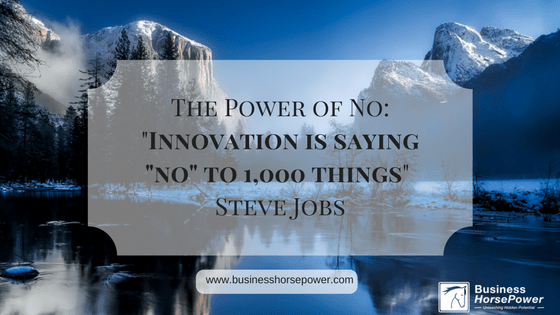“People think focus means saying yes to the thing you’ve got to focus on. But that’s not what it means at all. It means saying no to the hundred other good ideas that there are. You have to pick carefully. I’m actually as proud of the things we haven’t done as the things I have done. Innovation is saying “no” to 1,000 things” Steve Jobs
Over the past few weeks we have talked a lot about taking action and staying focused, and the quote above from Steve Jobs sums this up so well. Staying focused doesn’t mean saying yes to everything, in fact learning to say No is probably the most powerful action you can take. One of the challenges that I come across time and time again with entrepreneurs is that they want to do everything. Maybe you can relate to this?. Entrepreneurial Attention Deficit Disorder (ADD) is the curse of the entrepreneur because when it kicks in they jump from one project or shiny object to the next. And why is this? It’s because great entrepreneurs can see the opportunity and possibility in everything. And so they just want to pursue all possible options. The challenge is to remain focused when their energy and focus becomes distracted.
So how do you know what to focus on? Firstly, it is so much easier to say No when you are crystal clear what you want to say Yes to. When you have clarity on the reason why you are doing what you are doing, then it is easier to see what a distraction is. This is why, with every business owner I work with, we start by getting clarity on the purpose for the business. The purpose provides the GPS and sets the business owner in the right direction. After all, if for example, you were travelling to Singapore from London, you would instantly know that going to New York was not a sensible idea, as it is in exactly the opposite direction. So having a clear purpose helps you filter out distractions and items that might take you off course.
Having clear values also helps you know what to say No to because your values inform your thinking and actions. If you are asked to undertake a task that is in violation of your values then most likely you would not do it. Our values become our DNA, the basis of what we stand for. Without values we can become like a rudderless ship bobbing around on the ocean, getting swept one way and then the next, never making any progress.
As creative entrepreneurs we often come up with many different types of products and service lines. The reality is that you cannot be an expert at everything. When Mark Parker, become Nike CEO, in 2006, he asked Steve Jobs for his best advice and this is what Jobs said:
“Nike makes some of the best products in the world. Products that you lust after. But you also make a lot of crap. Just get rid of the crappy stuff and focus on the good stuff.”
Jobs calls the process of just focusing on the good stuff editing. It involves reviewing all your products, services and activities and then streamlining them. Whether it’s design or business strategy less is more. Nobody produces all masterpieces. You’ve got to edit it down and throw away the crappy stuff. Take away unnecessary hardware parts from your computer, unnecessary code and features from your app, unnecessary products from your offering, extra words from your presentation. This is not easy. It takes guts to take away a physical keyboard from a smartphone but the results can be astounding. Throw away the crappy stuff and focus on the good stuff.
So, how are you going to use the Power of No in your business? What crappy stuff are you going to release so that you can focus on the really good stuff? Think about this over the coming week and let me know in the Facebook group what you have said No to.

Julia Felton (aka The Business Wrangler) is the founder of Business HorsePower. Business leaders, entrepreneurs and executives hire her to accelerate their business performance by harnessing the energy of their people to work more collaboratively together. By aligning purpose with actions the team achieves exponential results as everyone starts pulling in the same direction.
Julia believes that business is a force for good and through designing purpose-driven businesses that leverage the laws of nature, and the herd, you can create businesses founded on the principles of connection, collaboration and community that make a significant impact in the world.






